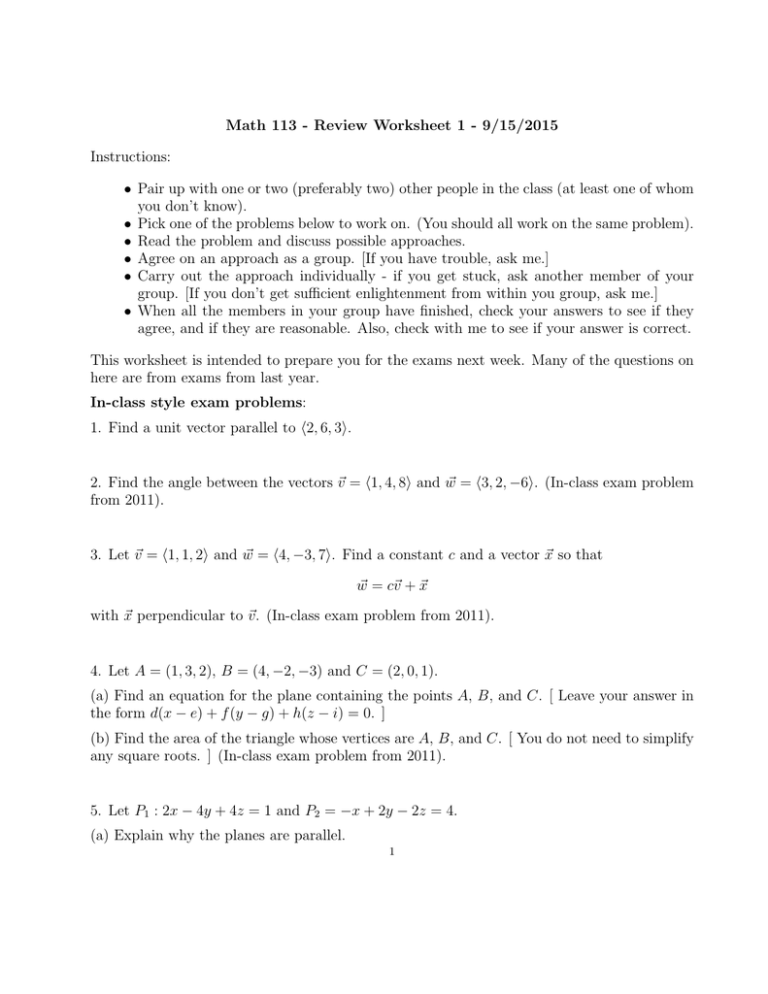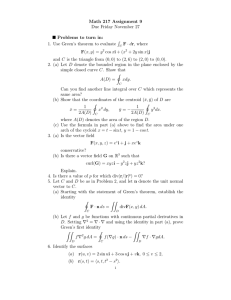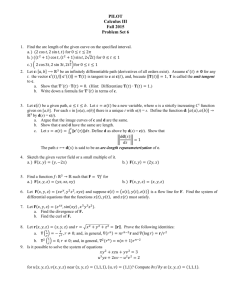Math 113 - Review Worksheet 1 - 9/15/2015 Instructions:
advertisement

Math 113 - Review Worksheet 1 - 9/15/2015 Instructions: • Pair up with one or two (preferably two) other people in the class (at least one of whom you don’t know). • Pick one of the problems below to work on. (You should all work on the same problem). • Read the problem and discuss possible approaches. • Agree on an approach as a group. [If you have trouble, ask me.] • Carry out the approach individually - if you get stuck, ask another member of your group. [If you don’t get sufficient enlightenment from within you group, ask me.] • When all the members in your group have finished, check your answers to see if they agree, and if they are reasonable. Also, check with me to see if your answer is correct. This worksheet is intended to prepare you for the exams next week. Many of the questions on here are from exams from last year. In-class style exam problems: 1. Find a unit vector parallel to h2, 6, 3i. 2. Find the angle between the vectors ~v = h1, 4, 8i and w ~ = h3, 2, −6i. (In-class exam problem from 2011). 3. Let ~v = h1, 1, 2i and w ~ = h4, −3, 7i. Find a constant c and a vector ~x so that w ~ = c~v + ~x with ~x perpendicular to ~v . (In-class exam problem from 2011). 4. Let A = (1, 3, 2), B = (4, −2, −3) and C = (2, 0, 1). (a) Find an equation for the plane containing the points A, B, and C. [ Leave your answer in the form d(x − e) + f (y − g) + h(z − i) = 0. ] (b) Find the area of the triangle whose vertices are A, B, and C. [ You do not need to simplify any square roots. ] (In-class exam problem from 2011). 5. Let P1 : 2x − 4y + 4z = 1 and P2 = −x + 2y − 2z = 4. (a) Explain why the planes are parallel. 1 2 (b) Compute the distance between P1 and P2 (that is, the length of the shortest line segment where one end is a point in P1 and the other end is a point in P2 ). 6. For each of the three surfaces below, draw the traces in the xy-plane, xz-plane, and yz-plane. Then indicate which picture matches the equation (figures I-III at the end of the worksheet). (a) z = x2 − 4y 2 . (b) 4x2 + y 2 − z 2 = −1. (c) 4x2 + y 2 − z 2 = 1. (In-class exam problem from 2011). 7. The spheres S1 : x2 + y 2 + z 2 = 1 and S2 : x2 − 2x + y 2 − 4y + z 2 − 4z = 0 intersect in a circle. Find an equation for the plane that contains this circle. 8. Match the three parametrizations of curves with the three pictures (figures IV-VI, see the end of the worksheet). Explain why your choices are correct. (a) ~r(t) = hsin(t), t, cos(t)i. (b) ~r(t) = hcos(t) cos(2t), cos(t) sin(2t), sin(t)i. (c) ~r(t) = ht2 − 1, t3 − t, ti. 9. Consider the curve ~r(t) = ht2 cos(t), t2 sin(t)i, 0 ≤ t ≤ 1. (a) Show that the length of the curve is given by Z 1 √ t 4 + t2 dt. 0 (b) Evaluate the integral in part (a). (In-class exam problem from 2011). 3 √ 10. Let ~r(t) = h3t, 6 2 1 3 t , 3t i 2 parametrize a curve. (a) Compute |~r 0 (t)|. (b) Compute T~ (t), the unit tangent vector. (c) Compute κ(0), the curvature at t = 0. ~ (0), the unit normal vector at t = 0. (d) Compute N 11. A particle is moving in space with acceleration ~a(t) = hcos(t), sin(t), 0i. It has initial velocity h1, 0, 1i and initial position h2, 1, 3i. Find the position vector ~r(t). Take-home exam style questions 12. A triangle has vertices A, B and C. The three medians of the triangle are the line segments going from one vertex to the midpoint of the opposite side. Show that all three line segments intersect in one point, and that this point is two-thirds of the way along each median. 13. A light ray is travelling along the line ~r(t) = h−2t + 10, t + 8, −3t + 7i. It hits the plane P1 : x − y + z = 3 and bounces off. Where does the reflected light ray hit the plane P2 : x + y − 3z = 1? (Take-home exam problem from 2012) 14. Let a, b, c, d, e, and f be fixed real numbers. Let ~r(t) = t~v be the parametrization of a line, where ~v = ha, b, ci and t ∈ R. Let P = (d, e, f ) be a point. Show that the distance between the P and the line ~r(t) is p (bf − ce)2 + (−af + cd)2 + (ae − bd)2 √ . a2 + b 2 + c 2 (Take-home exam problem from 2011). 15. A magnetic spaceship being flown by an alien is caught in a magnetic vortex and is traveling along the helix ~r(t) = h3 cos(2πt), 3 sin(2πt), ti. The spaceship has a (non-magnetic) escape capsule in it, but one that does not have an engine. The alien desperately wants to abandon the spaceship and return to their home planet, located at (−3, −2π, 5/6). 4 If the alien leaves the spaceship in the escape capsule, the escape capsule will travel along the tangent line to the path of the spaceship. At what time t should the alien leave the spaceship in order to return to its home planet? Justify your answer with words and equations. Figure I Figure II Figure III 5 Figure IV Figure V Figure VI




